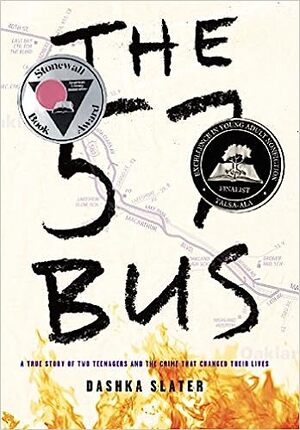Weekend Pick for June 23, 2023
Looking for something to read?
Check out our weekly suggestions!
Are your students looking for book recommendations?
Send them to browse through the picks for this or past years.
For the picks from 2022 click here
For the picks from 2021 click here
For the picks from 2020 click here.
For older picks click from 2019 click here.
For the even older picks click here.
Check out our weekly suggestions!
Are your students looking for book recommendations?
Send them to browse through the picks for this or past years.
For the picks from 2022 click here
For the picks from 2021 click here
For the picks from 2020 click here.
For older picks click from 2019 click here.
For the even older picks click here.

In The 57 Bus, a narrative, non-fiction retelling, Dashka Slater examines the non-binary experience and the effects of the juvenile justice system. Slater tells the intertwined story of two Oakland, California teens whose lives tragically intersect on a public bus one afternoon. Sasha (they/them), a middle-class white student at a private school, becomes the target of a prank gone terribly wrong. Richard, a black teen who attends an inner-city Oakland high school, answers a friend’s dare to light Sasha’s skirt on fire while they napped at the back of the bus. Richard, who only expected the skirt to smolder a bit, looks on in horror as Sasha’s legs become engulfed in flames. Scared of the repercussions, Richard and his friends leap off the bus without aiding Sasha. Slater describes in vivid detail this single event, one that will simultaneously change Richard and Sasha’s previously separate lives.
The 57 Bus is a heartbreaking but essential study in nuance and empathy. Sasha and Richard each belong to marginalized communities and experience the effects of systemic injustice. While Sasha is fortunate to have found love and support from their family as they form their identity, they are still a target for hate outside of their circle of family and friends. Richard is a black boy in Oakland, trying to navigate a world that actively and systemically oppresses his community. Richard and Sasha are both swimming against a current of injustice, and their story highlights the complexity of living as a minoritized person.
The 57 Bus is a heartbreaking but essential study in nuance and empathy. Sasha and Richard each belong to marginalized communities and experience the effects of systemic injustice. While Sasha is fortunate to have found love and support from their family as they form their identity, they are still a target for hate outside of their circle of family and friends. Richard is a black boy in Oakland, trying to navigate a world that actively and systemically oppresses his community. Richard and Sasha are both swimming against a current of injustice, and their story highlights the complexity of living as a minoritized person.

Richard admits that he has committed a heinous act but maintains that it was not done out of hate but was instead a poor choice that was never intended to cause Sasha physical harm. Richard’s admission leaves him vulnerable to the juvenile justice system, a system that is broken in its ability to rehabilitate. Black male teens like Richard are overwhelmingly represented in the juvenile system, and they often ultimately find themselves part of the adult prison system. While Richard must face incarceration within a system that is designed to maintain power over him, Sasha must recover from the physical and emotional harm that Richard’s actions have caused him.
The 57 Bus is a high-interest text and a quick read. It is not, however, an “easy” read. Slater’s retelling of Sasha and Richard’s story is fast-paced and compelling, but it is not without grief and frustration. Slater has rendered a narrative that asks readers to consider the complexity of humanity and the effects of systemic injustice on both a victim and a perpetrator. Slater concludes the book with two important chapters: “Some Gender Neutrality Milestones” and “Some Numbers: US Juvenile Incarceration”. These two chapters speak to the lived experiences of both Sasha and Richard, two teens navigating a world that is hostile toward their identities.
The 57 Bus is a high-interest text and a quick read. It is not, however, an “easy” read. Slater’s retelling of Sasha and Richard’s story is fast-paced and compelling, but it is not without grief and frustration. Slater has rendered a narrative that asks readers to consider the complexity of humanity and the effects of systemic injustice on both a victim and a perpetrator. Slater concludes the book with two important chapters: “Some Gender Neutrality Milestones” and “Some Numbers: US Juvenile Incarceration”. These two chapters speak to the lived experiences of both Sasha and Richard, two teens navigating a world that is hostile toward their identities.



 RSS Feed
RSS Feed